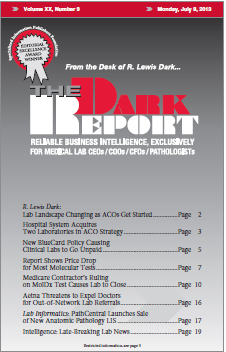CEO SUMMARY: In recent weeks, labs are reporting that Medicare contractors have begun to issue payments for molecular test claims filed—but unpaid—since January 1, 2013. A newly-issued analysis of this situation by Quorum Consulting indicates that, for many molecular assays, Medicare contractors are now paying less than they paid for the same tests last year. …
Report Shows Price Drop for Most Molecular Tests Read More »
To access this post, you must purchase The Dark Report.


